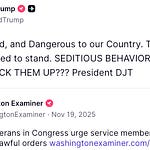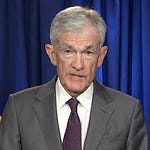Bob and Jack discuss recent reports of internal rifts at the Department of Justice, the loyalty pressures shaping the Trump administration, and whether constitutional reform is needed to curb the spiral of politicized prosecutions.
Mentioned:
The Imperial Presidency by Arthur M. Schlesinger Jr
“Part Enabler, Part Bluffer: The Bind of the Justice Department’s No. 2” by Glenn Thrush and Alan Feuer (NYT)
“How Should a DOJ Political Appointee Think About a Trump-Weaponized DOJ?” by Jack Goldsmith (Executive Functions)
Thumbnail: Todd Blanche exiting a press conference outside Manhattan Criminal Courthouse where President Trump was charged with 34 felony counts on April 4 2023. (Bruce Schaff, CC BY-SA 4.0)
This is an edited transcript of an episode of “Executive Functions Chat.” You can listen to the full conversation by following or subscribing to the show on Substack, Apple, Spotify, or wherever you get your podcasts.
Jack Goldsmith: Good morning, Bob.
Bob Bauer: Good morning, Jack.
This morning, we’re going to talk about stories in the last week, capped off by a story yesterday in the New York Times, about the position of the Deputy Attorney General Todd Blanche, and his relationship to the White House, to Ed Martin, who’s the head of the weaponization group in the Justice Department, and the connection between these events and what’s going on in the Eastern District of Virginia.
The basic story is that Blanche is being cut out of things, but I’ll let you tell the background and we can go from there.
Certainly.
Well, it does appear that there are significant fissures in the decision-making process or structure of the Department of Justice. It turns out, again, working with the reporting here, that Blanch and Bondi are extremely concerned they do not have control over people who should be their subordinates.
I’m speaking here specifically of Ed Martin, who I think is still the pardon attorney, as well as the head of the weaponization working group, and Lindsey Halligan, who has been put in charge. She’s the acting U.S. Attorney for the Eastern District of Virginia.
As we’ve talked about earlier, and as people know from the reporting, she’s an insurance coverage lawyer, but happens to have been a member of the president’s personal legal team. He has entrusted her with key responsibilities as far as he’s concerned.
One, bringing an indictment against former FBI Director James Comey, and now against New York State Attorney General Letitia James. It turns out that Blanche and Bondi have been very skeptical about these cases, but one way or the other, it was determined, presumably at the president’s direction, that those cases should be brought, and Halligan brought those cases.
That when she brought the James case, in particular, which is the most recent of those two indictments that were brought, she did not coordinate or inform the attorney general of the United States.
Tensions have also clearly developed between Blanche and Ed Martin. Ed Martin took some action in relation to Alex Jones and a defamation suit that had been brought against Alex Jones that Blanche thought were extraordinarily ill-advised.
He attempted to bring some pressure on a witness at that trial, who’s a former FBI agent, as I understand the reporting, and Blanche could not understand why he would associate himself with Jones in this particular enterprise, and asked him to rescind the challenge that he’d issued to that agent’s lawyer.
Long and short of it, he did rescind it, but there’s this ongoing suggestion that Martin and Halligan are, if you will, working their own projects there—and one has to assume, with what they believe to be presidential approval—so you really have a department in what appears to be significant decision-making disarray and substantial questions about what we’re going to see or how we’re going to see this play out in the future.
So I’m curious, given all of that, what do we make of it? I mean, what’s going to happen?
Let me add one more detail and then I’ll address that. Another extraordinary thing about this situation, as the New York Times made clear, in addition to everything else you said, is that they make clear Blanche has been carrying the president’s water.
I mean, he’s been violating traditional Justice Department norms and doing the president’s bidding in a whole bunch of contexts, but as the New York Times made clear, and this is my understanding from conversations I’ve had as well, he has pushed back on some of the most extreme stuff, which included, as you said, having questions and concerns about the prosecution of Comey and James and EDVA.
So the extraordinary thing is he’s a serious loyalist, he was the president’s defense attorney, and he’s been carrying the president’s water, but he’s been cut out nonetheless because he’s not intense enough in carrying out the president’s agenda.
So what do I think about it? I mean, everything about it is extraordinary from a traditional perspective.
I mean, as I’ve said many times in our conversations, the president gets to organize legal advice how he wants, and he appears to be getting it from significantly down the DOJ chain and then barking out orders from the White House without coordinating with or really being interested in what the attorney general and the deputy attorney general are saying.
So I don’t understand how this is a tenable position for the attorney general or the deputy attorney general in running the department.
It’s clear that Ed Martin has the president’s ear and extraordinary power here, as does Halligan. So everything about it, given that the president can get legal advice how he wants, he’s arranged things where he can get the legal advice he wants from the most extreme person, and basically that the president is taking the advice from the person who allows him to do maximally what he wants to do.
I don’t see how it’s tenable for Bondi and Blanche.
I mean, they’re denying these reports or they’re indirectly denying them, but I have every reason to believe that these reports are accurate. And I don’t see how it’s tenable to run the department this way.
But again, I want to just draw one more analogy, then I’ll turn it over to you.
The system that the president has set up here is kind of like a version of the system that DOGE set up, by which I mean you have someone who is reporting high up and directly to the White House or the White House inner circle from down in the bowels of the department—deep in the agency or the department—who knows what’s going on and can inform the president about what’s going on.
And then the president, based on this information, can send instructions—or there’s someone in the White House who can send instructions—to the agency, to the relevant person, to carry out the task. It really is a variation on Doge, and it is a way for the White House to exert maximum control over the department’s direction.
So that’s my basic reaction. What do you think?
Yes, I totally agree with the DOGE analogy.
You know, we know that White Houses have chafed in the past under the norms that constrain their communications with the Department of Justice. This is the death of the norm for all practical purposes.
Now Blanche has given, as Bondi has, occasional lip service to the idea that they’re only, you know, looking at the facts and following where they lead and applying the law appropriately.
So there are noises made in the direction of sort of rule of law as the standards that the department will follow.
But here you have—and I should emphasize this—not only two indictments that the attorney general, the deputy attorney general, and career prosecutors in the Eastern District of Virginia did not think had merit, that were filed anyway, filed by somebody who was brought in from the president’s history of personal lawyers, his cadre of personal lawyers, who doesn’t have any prosecutorial experience, and who could not get the prosecutors in her office to help her.
And there’s reporting this morning that one such career prosecutor, who was apparently not compliant, has been removed from her position.
So it’s in effect, a purge taking place in the office of those who are concerned about Halligan’s reaction.
And we don’t think it—there’s no indication that it’s going to end here.
There are other cases, for example, one that allegedly has at least stirring around that may be brought against Senator Adam Schiff of California.
I don’t think this enemies list is short. And I don’t think that his travel through that enemies list is complete.
So I don’t think it’s tenable.
One question I want to ask you is, how long can an Attorney General of the United States and a Deputy Attorney General of the United States, who do have law degrees, they do have public careers, they did testify before the Senate and make certain commitments before they were confirmed—how long would you imagine they could tolerate a situation like this?
So even if periodically, for example, Deputy Attorney General Blanche pushes back, the overall picture is he’s going to go along with what the president—or he can’t stop the president from doing what the president wants to do—for example, in bringing retributive cases against his enemies.
How long can they retain their positions in good conscience under these circumstances? Or am I just putting the question the wrong way?
I don’t know what you mean by good conscience, but I think they can go on a very long time because it’s clear that the uber norm here is loyalty to the president and carrying out the president’s wishes.
The attorney general and the deputy attorney general have made that very clear.
Now, the remarkable thing about the story, as I suggested, was that at least Blanche has taken into account some institutional concerns about the department in trying to resist some things the department is doing.
But now that the president has made his wishes clear, I don’t see how Blanche or Bondi could really have grounds within their consciences, as you say, for pushing back, because they’ve made clear that the thing they care most about—and the most important norm—is loyalty to the president.
It’s just that the president has found a way to circumvent them when they do not do every single thing he wants to happen.
So, I mean, it’s obviously a personal set of trade-offs.
We’re already far beyond where many people could be serving in these positions.
But I just think it’s an entirely different arrangement with a different set of norms than we’re used to.
What I had in mind, I should have been clearer about it. When I say good conscience, these are lawyers who have taken oaths.
Those oaths were not to the president of the United States in his person or for his political good fortune. They took an oath before the Congress when they testified.
And I think if we go through their testimony, they said presumably all the right things about the kind of Department of Justice they pledged that they would be running. Certainly, the events to date show they have been unsuccessful or complicit in it not running the way that they said that it would and not in a manner that comports with their oath.
These are lawyers and they do have responsibilities. And if they are prepared at the end of the day to surrender in the face of presidential assistance, insistence, and watch cases that lack merit be brought for purely personal retributive reasons, they are not conforming to their professional obligations and they are not keeping the commitments they made to the Congress in anticipation or in return for being confirmed.
So I don’t disagree with that description. I would just complicate it a little bit.
Again, I don’t know what precise obligations they made to the Congress. And it wouldn’t be the first time that the Attorney General or the Deputy Attorney General didn’t comply with every jot and tittle of what they represented to Congress.
But clearly, they are massively departing from the way the Department of Justice has run.
But the counterpoint I would make is—I mean, professional obligations, we might have a difference on this.
I mean, obviously, they have professional obligations in virtue of their bar memberships and the ethical rules governing lawyers. I’m not sure how much those rules govern them compared to Article 2.
And as a technical matter, Article 2 allows the president to determine the law for the executive branch.
And they can tell themselves—I wrote about this a week or two ago—they can tell themselves a story about how, well, it’s the president’s call, Article 2 says that. And I believe as a formalism, that’s a fair argument.
I believe—I mean, I think of these things as matters of, you know, personal responsibility, personal conscience, rather than ethical obligations as a member of the bar. I think those, what I just described, are the more salient ones.
And I don’t see how anyone could be serving this president in a political capacity and carrying out these instructions that are so clearly contrary to law, so clearly contrary to basic ethical commitments, and bringing cases that have no basis whatsoever.
So, I mean, I reach the same conclusion as you. I think it’s difficult for them to stay on from my perspective. But from their perspective, I don’t think—I mean, it’s hard at all, especially when—let me just say this last thing I’ll say—there’s this extraordinary loyalty dynamic inside the government, whereas the most intense and extreme person who can flag the most intense loyalty to the president along those lines wins, and there’s kind of a ratcheting up.
And they’re clearly being subject to those pressures now. And they, you know, it’s remarkable that they were—that Bondi and Blanche were not sufficiently loyal.I think it’s difficult for them to leave also, because what do they do then?
I mean, they can’t leave in protest. How are they going to leave in protest? They could leave and make up some excuse. But I think they’re—you know, it’s embarrassing.
And I don’t know where their personal lines are, but I think that given the basic loyalty dynamic, they could continue very long.
Yes. And my view is that subscribing to the loyalty dynamic, as you put it, is just not compatible with their public responsibilities in those roles.
And so it’s hard for me to imagine, even on an individual basis, whatever they think about the president’s Article II authority, they can’t imagine that being complicit in a program of weaponized law enforcement is something that they, as lawyers, should countenance.
Let me ask you this question. You and I have written about this. This is spiraling downward.
It doesn’t appear that this retribution program is going to come to a conclusion anytime soon. How is this all going to be put back together again?
Will we have a president like Jimmy Carter, who comes back and says, I’m going to appoint an attorney general who will actually never talk to me and make decisions fundamentally independently? I won’t even leave the appearance of White House interference, etc.?
Or has the norm shifted in such a way that that won’t be the expectation anymore? And there will be, as there often is in these partisan wars, a view on the part of Trump’s opponents that, at the end of the day, when the Department of Justice shifts hands, fire has to be fought with fire.
And there are people who will have to be brought to account for what they did over these years, and so forth.
However you play that out, it could wind up that the norms have shifted.
Should we revisit what the bar rejected after Watergate and think of—and I know it’s not going to happen tomorrow, I don’t want to sound unrealistic—fundamental institutional reform, as in constitutional reform, that creates genuine barriers to presidential interference in law enforcement decisions?
So that’s a big question. Let me just say a few things. First, I agree with you—this is just getting going. It’s going to get much, much worse.There are going to be many people that are subject to this process. It’s hard for any institution other than Congress to stop.
Courts can ultimately—courts and juries can ultimately—put a stop to it, but not until there’s been a lot of pain inflicted and a lot of harm done. And so the department can go on for a very long time. They have a very long list, and I think it’s going to get a lot worse.
I also think that we’re already seeing the retaliation. I mean, in some sense, we’re still litigating the ethical obligations of Trump-era lawyers, which the Trump people see as weaponization. We see groups that are now bringing ethical bar claims against the people that we’re talking about.
The likely outcome of this is a continued downward spiral, and the next Democratic administration, I think, uses these tools because they’re going to tell themselves, well, that was awful what happened, we need to investigate.
And then the cycle is just going to—and again, without judging or equivocating—the cycle is going to continue. I do think at some point, and when things get bad enough—and they will get much worse, I believe, on this dimension—that there’s going to have to be a rethink about the way the executive branch runs.
Don’t think that it can be done simply through norms. I don’t think it can be simply done through legislation. I think there needs to be a fundamental rethink of executive power, but let me just say that is so much easier said than done.
There is a reason why, given separation of powers, that the executive—that we have a powerful executive. We’ve always needed a powerful executive to make separation of powers work. As I’m fond of quoting Arthur Schlesinger Jr., it’s not a matter of just reforming the presidency.
If you reform the presidency constitutionally, you’re talking about reforming the federal government constitutionally. It’s such a big task. I don’t even know where to begin. One place that I would begin, fairly narrow places, is with the pardon power, because we haven’t seen this yet, but it’s quite clear that President Trump is going to use the pardon power in a massive way to exonerate everyone who’s doing everything for him.
I have zero doubt that that’s going to happen. That’s one place to start.
So I guess my answer is, I think that the kind of reforms that you and I talked about in our book of 2020 seem quaint now, and we, in that book, said that constitutional reform should be off the table.
I think it has to be on the table. I’ve been thinking about it, but it’s extremely hard.
It is hard. But I agree with you that it has to be on the table.
And I also think—maybe to be realistic—is to accept, and this has happened before over the history of the country, that at times, settled constitutional understandings and the associated norms become unsettled.
And they become unsettled for a reason, and they cannot be retrieved and restored, if you will, fully to what they were before.
And that makes the task of thinking through these reordering issues—these constitutional reform issues—really quite urgent.
Because what we’ve seen is that what Arthur Schlesinger referred to as the need for—and he’s not obviously the only one—I mean, Alexander Hamilton’s often quoted on the requirement of an energetic executive.
What he had in mind, he could not have understood to be anything like what we’re seeing here.
When he thought about presidential abuses—and correct me if I’m wrong—when he thought about the imperial presidency, he was primarily concerned with the president’s assumption of extraordinary power in war making, in deploying military troops overseas.
But now we see that that door swings both ways.
And we see, I think, the president exercising power—and in particular, for purposes of our talk today, in law enforcement—in a way that’s very hard to imagine that Arthur Schlesinger had somehow forecast or predicted or thought was possible.
Well, he did. I actually, just by habit, just reread and taught The Imperial Presidency in a seminar I’m teaching. And I was surprised because I didn’t remember this. Yes, most of that book is about war powers, but this may have been an afterward. I think it might have been in the afterward. He goes through the Nixon administration and all of the Watergate-related problems.
And one of the things that struck me about that was, there were a lot of precursors to Trump in the Nixon era. I mean, they were dim precursors, but most things that Trump was doing were previewed in the Nixon downward spiral. And Schlesinger went through all of those. But he—again, the author of The Imperial Presidency—resisted constitutional reform, and he went through it in great detail.
I agree with you. He could not have imagined the degree that it would have come to.
So, again, I don’t know. I don’t know where it goes, but I think that we have to start having discussions about whether the current conception of the executive branch, as understood by the executive branch, as understood by the Supreme Court, as Article 2 has been interpreted, is one that can persist.
For the first time in 40 years of thinking about this, I’m starting to wonder whether it can.
Well, and let me just add this as we come to the end of the conversation. The task is going to be to bring home to the audience for this discussion what I think should be clear.
And that is, this is not a one-party issue. This is a two-party issue.
As we’ve been discussing throughout this talk, any president of any party in a system that is lacking in norms—in any of the kinds of constraints we previously thought were operative—could behave the way that Donald Trump is currently behaving. And he’s now showing—he’s establishing a precedent for doing it. He’s showing it can be done.
Nixon would deny at all times during the darkest days of his presidency that he was operating out of compliance with the law or with norms.
Donald Trump is certainly, at least with respect to norms, not making any pretense that he doesn’t care for them and that he’s going to operate outside of them and that he’s going to bring, as necessary, people to do his bidding who have no experience with the norms, no appreciation for the norms, and, as you’ve said, are guided principally by personal loyalty to him.
And as you pointed out, I couldn’t say it any better. This is not a tenable situation.
I think maybe that’s a good place for us to stop. Thanks, Bob.
Thank you.













